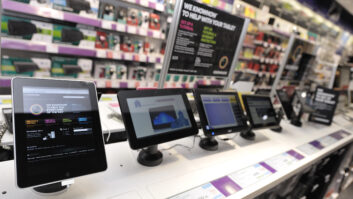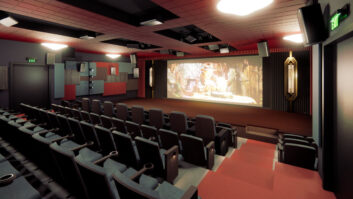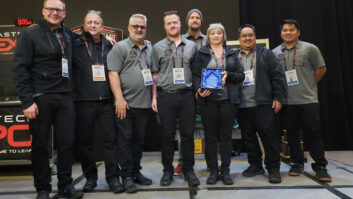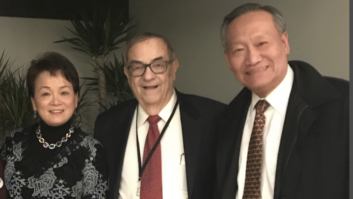ARLINGTON, VA. — In 1981 the Ninth Circuit Court in San Francisco ruled that the Sony Betamax was illegal. The plaintiff in the case, Universal Pictures, and the rest of Hollywood then rushed to Congress and lobbied that video rentals should be illegal. Today the entertainment industry, which eventually lost the Betamax case in the U.S. Supreme Court in 1982 and has made untold billions with prerecorded video, is fighting to redefine the concept of fair use in the digital era.
There are many common threads to what happened 20 years ago and what is happening now in the consumer electronics industry. A key figure in those two battles, and so many other issues that have faced the CE industry during the past two decades is Gary Shapiro, president and CEO of the Consumer Electronics Association (CEA).
This year marks Shapiro’s 20th anniversary with the association. He first joined the Electronics Industries Association (EIA) where he represented CEA as government affairs director in 1982. He really began working full time for the CE industry as an associate with D.C.-based law firm Squire, Sanders and Dempsey during 1981 and helped prepare the Sony Betamax case for the Supreme Court.
For many executives being a player in an industry-changing decision like that one would be the highlight of a career. And while the Sony Betamax case is significant in Shapiro’s portfolio of accomplishments, it is one of many during the past 20 years. As general counsel of EIA, VP of the EIA’s Consumer Electronics Group and now the top executive at CEA, Shapiro has seen it all during his tenure and helped change the direction of the CE industry and it’s main event, the International CES.
He was honored at the CEA Industry Forum & Fall Conference held in San Francisco during October and a dinner in Washington D.C. last month for his contributions to the industry. For someone who is usually in the spotlight and can be a passionate, in-your-face advocate of the industry, as well as CE’s cool and calm diplomat, all of the attention seemed to surprise him.
When Shapiro sat down with TWICE recently to discuss his career, he was non-plussed at all the attention and reflected on the industry and his accomplishments over the years. Here is some of what he had to say.
First off, does it feel like 20 years since you joined the industry?
It only feels like a couple of years. When you start out you don’t think you are going to do something for 20 years, whether it is a job or mortgage or whatever. It has been exhilarating. With all these parties, all of this retrospective — and they’ve given me a watch — I’m thinking [CEA] is trying to give me a message!
But seriously, the anniversary was not something I focused on. We’ve had a rule at CEA, unlike other associations: the issue comes first. If the association is quoted in the story, that’s great. Who gets quoted is the last consideration. So to talk about myself is a little difficult. I don’t think the industry recognizes all we do because of this approach. This has never been the ‘Gary Shapiro Association,’ but the Consumer Electronics Association.
When was the first time you attended CES? What did you think?
Great question because I was at the law firm at the time and thought that this was the most exciting event in the world. It was maybe June 1982, Summer CES in Chicago, and I said to myself, “I want to be part of this. How can I?” I was very open to a job offer. When the offer came my way my mentor at the law firm, J. Edward Day, who had been President Kennedy’s Postmaster General, said to me, “Don’t take the job. People who work for associations go there to retire or die.” He thought the pace would be very slow. He didn’t know the CE business and he didn’t realize that a job is what you make of it.
How has the association changed during the past 20 years?
It has changed phenomenally. When I first joined the association we had a dozen employees in Washington under [CES founder] Jack Wayman and another office in Chicago headed by Bill Glasgow, who ran the Winter and Summer shows with ten employees. So we had just over 20 employees and only had about 60 members. It was a big boys club and it stayed that way for about the next eight to ten years.
When were you approached about taking the top job at what now has become CEA? Were there any reservations on your part?
When I was offered the job in 1990 I discussed it with my mentor, Jerry Kalov [long-time CE executive and currently CEA industry consultant]. The main issues were would I be allowed to grow the association in consumer electronics and expand the definition of what CE is? Will I be able to go after new technology and go after smaller companies and have them join the association? Jerry told me the board would approve all that. Now we are a powerhouse association. We’ve grown from 60 to 70 members to well over 1,000 today. Our reputation has grown. While we still have a contractual relationship with EIA we are now a separate corporation that has grown.
What do you think the biggest contributions you and CEA have made to the industry during your tenure as head of the association?
Again, to talk about myself is a little difficult, but I can tell you several things that I am very proud of. Protecting home recording and video rental rights is right up there. I’m also very proud of the strategic push for HDTV. From the testing labs, to tackling government impediments that had to be removed, to the marketing of it. Many companies, like Mitsubishi, will credit [CEA] for making a huge difference in its sales. While we didn’t create the technology, the association has made a huge difference in pushing it along.
What other contributions are you proud of?
Well, the concept of home theater. We didn’t invent the phrase, but the association popularized it. When I first took this job in 1990 I asked, “What could we do to bring the Audio and Video Divisions [of CEA] together?” It became home theater. We launched plenty of projects and programs to successfully promote the concept.
International CES is a story in and of itself. What are your feelings about how the show has evolved over the years?
I’m proud of the Consumer Electronics Show. It is stronger than ever before, and it has doubled its size. We did about thirty things beginning about five years ago to reposition it. Our keynote speakers, bringing in corporate buyers, more domestic media, international media and the financial community has been very important. We focus on creating an environment that is designed for attendees. We invest in the show heavily. If you look at some of the other shows that have crumbled, it has happened because they suck profit out of the show. And we are very ethical in the way we document how many people we attract and how many exhibitors we have.
We continually invest in the show and use it as a platform for the industry to get consumers focused on consumer electronics, and to position the industry in front of government leaders, in a way that gives [the industry] tremendous power and influence.
Of course there have been some problems with CES along the way, such as closing the Summer show in Chicago and going with the one event in Las Vegas.
We’ve made some of the biggest career mistakes with the show as well. We lost Summer CES to E3. It wasn’t something they gained. It was something we lost. I disagreed with the board on how we approached the video game industry. Someone said they would come back to us on our knees. I fought and lost on that one.
During your years as head of CEA you’ve met and worked with many top executives. Which come to mind that you think have guided you over the years?
Jerry Kalov stands at the very, very top of that list. He has been my mentor for 12 years. In the early ’90s he told me, “You’re doing a great job, but when you make some mistakes, and you will, I’ll be there for you.” Well I did make some mistakes and he was there for me. He has been, by far, the most influential person in my career. Of course J. Edward Day, [former EIA president] Pete McCloskey, and certainly Joe Clayton, Darrell Issa and new [CEA] chairman Kathy Gornik. I have also benefited from the support of a very entrepreneurial, creative and active board.
From your perspective at CEA, what does the future of the industry look like?
I believe we are in the toddler stage as an industry, we have so far to go. Certainly with the beginning of digital, but with broadband, with greater storage, with new video displays, better transmission systems, we are still at the beginning of where we are going to be.
And where we are going to be is creating products that fundamentally enhances people’s lives. For instance, our products are ending tyranny. From the fax machine, to the VCR, to the PC, to broadcast television, we are enabling people to exchange information so they cannot be misled. You combine a free press with our products and you have a good definition of democracy.
On another level the industry is changing lives by giving people access to information and education, on medical care for example, in ways that can lift the poorest people in the world. We are not there yet … but things are improving.
And finally, what about Gary Shapiro’s future? How long will you be around CEA and the CE industry?
I’ll be around as long as people want me and I find the job interesting. I’ve seen enough people who have been around too long so I hope I know when it’s time to leave. I love the people I work with in the industry. I love the staff at CEA, which is tremendously hardworking. They are phenomenal. And of course we have a great amount of great and generous industry volunteers.
But there are certain aspects of this job that are difficult. When the industry is divided, and we’ve had a little of that recently, that’s tough. The political stuff in Washington is difficult, but other than that I have the best job in the world.
For instance, I was in a meeting this morning with other industry association heads and I listened to them. None of the industries were as exciting or interesting as our business. We are in the most exciting business … and we are making a difference in the world. I feel truly blessed.













